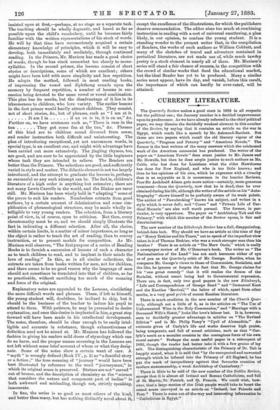CURRENT LITERATURE.
The Quarterly Review makes a good start in 1883 in all respects but the political one ; the January number is a decided improvement upon its predecessor. As we have already referred to the chief political paper, we may dismiss the decidedly weakest element in this number of the Review, by saying that it contains an article on the war in Egypt, which reads like a speech by Mr. Ashmead-Bartlett. But there are two papers which recall the old literary vigour of the Quarterly, "Progress and Poverty" and "American Novels." The former is the best written of the many answers which the celebrated work of the American economist has produced. The writer of the paper on "American Novels" does scant justice to Mr. James and Mr. Howells, but then he does ample justice to such authors as Mr. Cable, who has done for Louisiana what the elder Hawthorne has done for New England, and who is too little known; and then he has opinions of his own, which he expresses with a vivacity that is as enjoyable as it is uncommon in the heavier Reviews. Poor Sir Archibald Alison gets more notice—certainly, more generous treatment—from the Quarterly, now that he is dead, than he ever obtained during his life, although the writer of the article on his "Auto. biography" shows himself to be perfectly aware of its weak points. The author of " Pawnbroking " knows his subject, and writes in a style which is never dull; and " Corea " and "Private Life of Car- dinal Mazarin" are also well worth perusal. The former, in par- ticular, is very opportune. The paper on "Archbishop Tait and the Primacy," with which this number of the Review opens, is fair and discriminating.






































 Previous page
Previous page